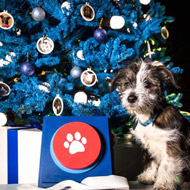
Each light represents 50 individual donations
The first-ever donations-powered Christmas tree has been created by the Blue Cross in a bid to save pets’ lives.
Based at the Blue Cross rehoming centre in Burford, the tree is part of Blue Cross’s ‘Action On Pity’ campaign that aims to encourage the public to take action on homeless pets rather than just feel pity for them.
Decorated with 50 fairy lights, the tree will only light up in response to donations. It launched with just one solitary light and, as the donations roll in, more bulbs will illuminate.
Once fully lit, the tree will represent thousands of individual donations which will help Blue Cross look after the hundreds of pets in its care this Christmas.
“The festive period is meant to be a happy time of year for everyone but we expect to be caring for over 1,000 sick, injured and homeless pets across our 11 rehoming centres on Christmas Day this year,” commented Blue Cross Burford rehoming centre manager Jenna Martyn.
“Our beautiful Christmas tree will shed a light on the work that all our valued centre staff and volunteers do at our clinics and rehoming sites across the country. Blue Cross is totally reliant on public donations to continue its work helping pets in need.
“Every light on our tree represents the kindness and generosity of those who’ve sent in donations to help the pets in our care and every single donation is very welcome.”
Blue Cross gave the task of switching on the tree’s first light to Max, an 18-week-old Jack Russell terrier puppy who will be spending Christmas with his new family.
Joined by a horse called Banks, Max gave staff and visitors a tantalising glimpse of what the tree would look like fully lit, before turning the lights off again in readiness for the public’s support.
Each of the lights on the tree represents 50 individual donations received through the post from 24 November.
The Blue Cross will count the donations by hand as they come into the charity. The organisation hopes that the public’s response will see the whole tree lit within the coming four weeks.



 The Veterinary Medicines Directorate (VMD) is inviting applications from veterinary students to attend a one-week extramural studies (EMS) placement in July 2026.
The Veterinary Medicines Directorate (VMD) is inviting applications from veterinary students to attend a one-week extramural studies (EMS) placement in July 2026.